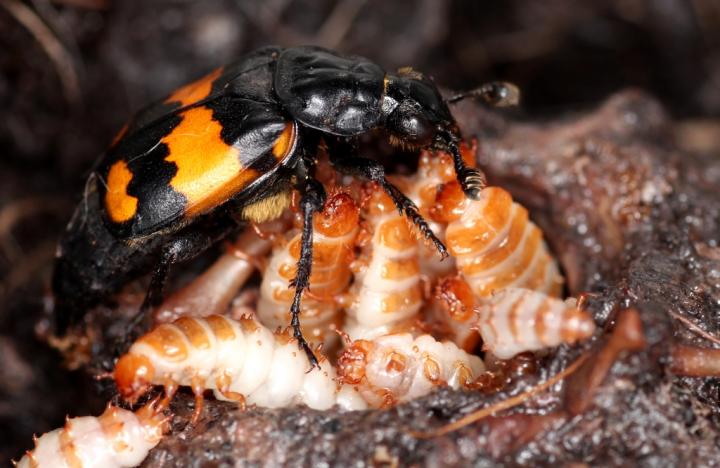
Credit: Nick Royle
Older parents are less flexible when it comes to raising their offspring, according to a new study of beetles.
University of Exeter scientists studied a species of burying beetle which raises its young on carcasses of small animals such as mice or birds.
They found that younger females adapted the number and total weight of offspring, and the effort they put into caring for them, based on the size of the carcass (smaller carcasses mean less food is available).
Meanwhile, older females largely ignored the conditions and put consistently high effort into reproduction.
“Being flexible can help organisms adapt to rapid changes in their environment,” said Dr Nick Royle, of the Centre for Ecology and Conservation at the University of Exeter’s Penryn Campus in Cornwall.
“It makes sense to produce more offspring when food is plentiful, and less when it’s scarce.
“However, such flexibility takes effort and energy.
“So, for older beetles that may not get the chance to breed again, the best strategy might be to invest everything you have, regardless of the situation.”
Like baby birds, young burying beetles beg to their parents for food and are fed by regurgitation in return.
The researchers varied the size of carcass available to the beetles to see how mothers responded.
Young mothers showed restraint – when less food was available, they saved resources for future reproduction – while the effort put in by older mothers was largely unaffected by the size of the carcass available.
Dr Royle said: “Parental care is hard work – it is costly – so it makes sense not to expend more energy than is necessary if there is a good chance you will get an opportunity to breed again.
“That is what the younger mothers are doing here – protecting assets for future reproductive opportunities by not engaging in high-risk behaviours.
“Flexibility is the key to this.
“But for older mothers, the chance of them breeding again is less likely so it is better to just go for it now as they might not have a future.”
He added: “To our knowledge, this is the first time such age-dependent plasticity (flexibility) in parental care has been shown.
“It helps us to understand why there is such variation in plasticity in the natural world and how this can help organisms adapt to changes in their environment.
“Being plastic is good for burying beetles, but only when they are young.”
###
The study, published in the journal Animal Behaviour, is entitled: “Are older parents less flexible? Testing age-dependent plasticity in Nicrophorus vespilloides burying beetles.”
Media Contact
Alex Morrison
[email protected]
44-013-927-24828
Related Journal Article
http://dx.




